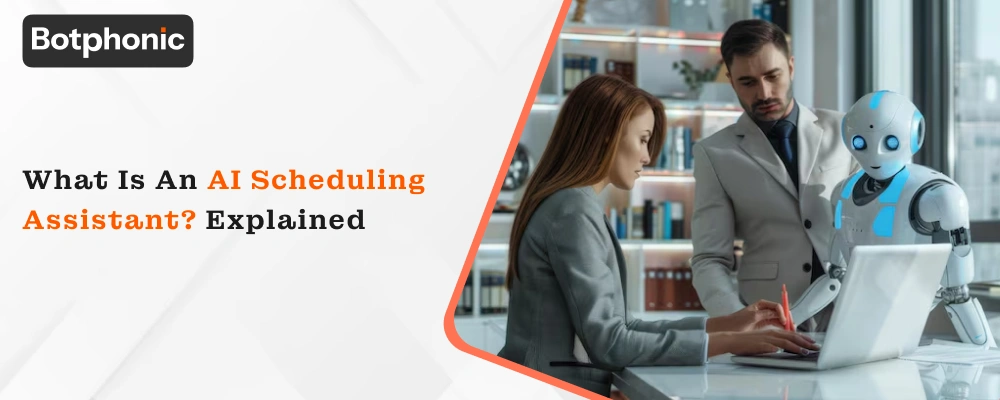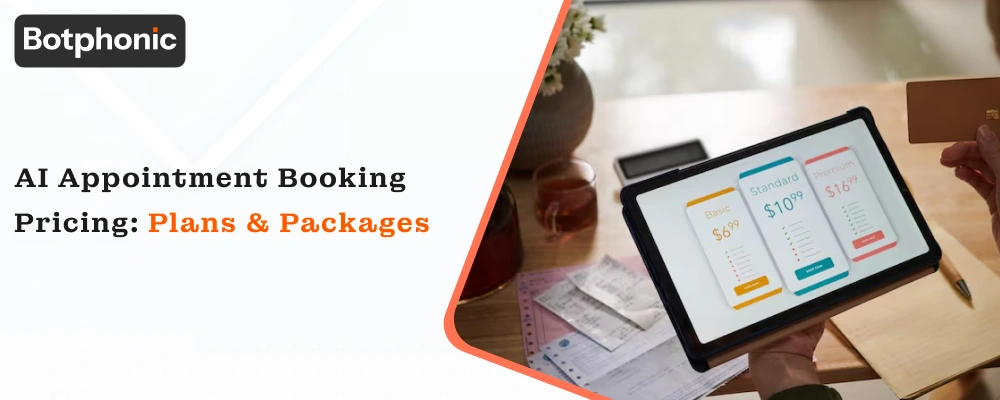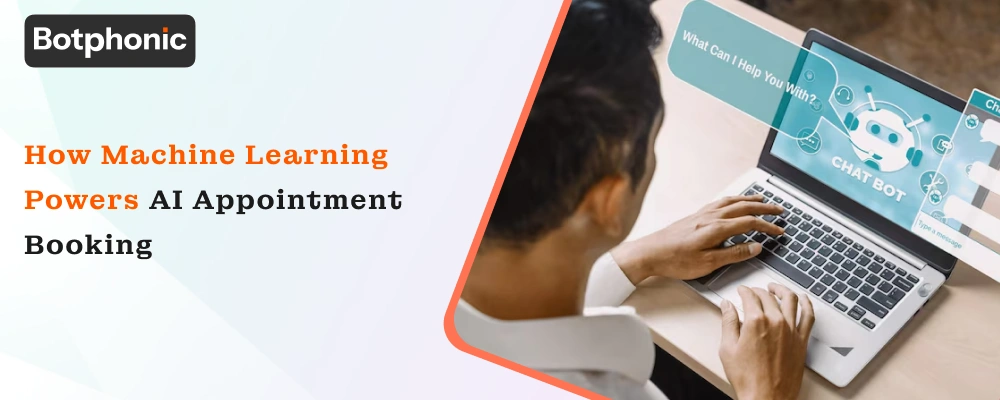
Summarize Content With:
Quick Summary
In this article, we will be discovering how machine learning is optimizing AI appointment booking and what the key benefits of implementing it across industries are. We will be exploring:
- Machine learning integration enables predictive analysis, smart automation, and continuous learning.
- Cross-industry versatility, where AI appointment booking platforms are offering a tailored experience to each.
- Automation and cost efficiency of AI, where it automated manual booking and reminders, resulting in a significant drop in administrative workload.
Introduction
The process of appointment has never been problem-free for customers and businesses alike. Frustration was the only result of long waiting times, missed calls accumulating, and slots being double-booked. However, if businesses had a machine learning appointment booking system, they would be able to manage their schedules brilliantly.
AI systems are now capable of handling voice calls, online forms, and calendar integration without any issues. While automating the patient booking process in healthcare via AI to create a small business AI appointment booking bot, the use of technology is such that errors are reduced, customer satisfaction is improved, and operational costs are even saved.
What is an AI Appointment Booking?
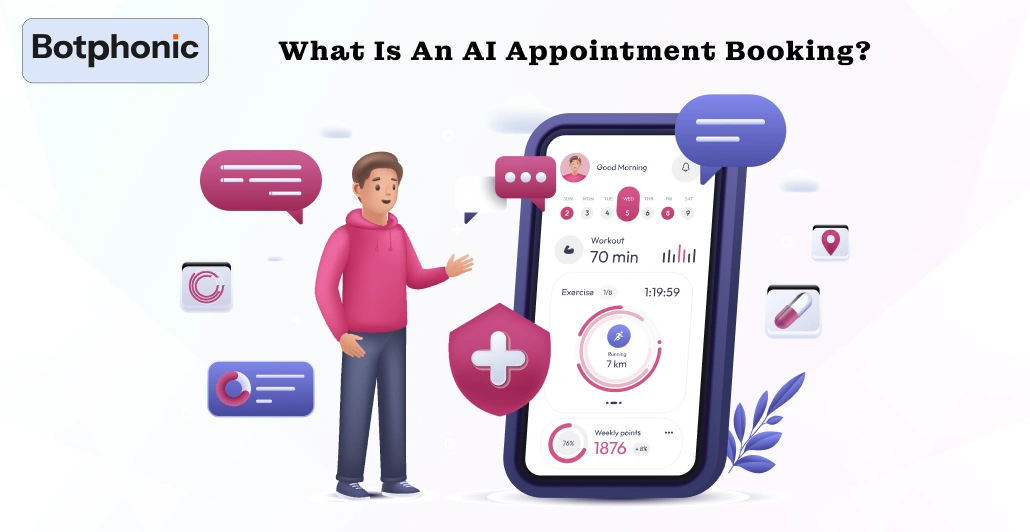
An AI appointment booking is a scheduling system. It is automated and powered by machine learning algorithms. Unlike traditional approaches, AI learns from previous interactions, keeps track of the likely cancellations, and schedules in a way that there is no wastage of time.
Some of the most important differences that the AI system is characterized by are:
Manual booking is usually dependent on human involvement and is very much susceptible to mistakes.
AI systems like Virtual Assistant for Appointment Booking operate around the clock and can handle a large volume of calls without getting tired.
They are highly efficient in a variety of industries like healthcare, auto services, and home maintenance.
How Machine Learning Has Modernized Appointment Scheduling?
The application of machine learning is the driving force behind the modern AI appointment booking systems, which convert the laborious process of scheduling into an intelligent and automated workflow. AI applications learn from the data continuously, recognize the patterns, and thus get to the point of faster and more precise scheduling.
1. Predictive Analytics
One of the benefits of drizzling large amounts of data with machine learning is the ability to easily ascertain and predict booking times, customer preferences as well as possible cancellations. For instance, AI in the patient appointment-solving process can predict no-shows and offer automatic rescheduling. The flow of this prediction-based method is as follows:
- Healthcare: Detects patients who are unable to keep their appointments and suggests a more convenient time for them.
- Automotive Service: Automotive Service: Forecasts when customers want their cars to be serviced. Also, make sure that the right number of technicians with proper skills are on hand for the service.
Thus this predictive strategy leads to less time wastage and better efficiency of operations.
2. Natural Language Processing (NLP)
The AI in scheduling applications is based on machine learning, which is the leading technology for voice recognition and comprehension in AI call assistant. The AI using NLP technology is able to comprehend the spoken or even typed requests.
Moreover, it works with many languages for the support of multilingual AI appointment booking systems. They are also capable of handling intricate requests such as rescheduling, cancellation, and special requests on their own.
3. Smart Automation
Machine learning helps the AI in doing the same old tasks over and over in the scheduling process, and it automatically sends confirmation and reminder texts. It also does the job of finding the available time slots based on the clients’ preferences while putting the urgent or high-value appointments on top of the list. AI virtual receptionist appointment booking systems are also taking advantage of ML to dynamically optimize workflow and release live agents to concentrate on the most important tasks.
4. Continuous Learning
Machine learning based appointment systems continuously improve over time; they learn from past bookings and cancellations effectively. Moreover, it also adjusts predictions based on new trends, for example, seasonal demand or unexpected spikes in the system. It also optimizes the data for maximum resource utilization and minimal downtime.
Curious to know the benefits of an AI appointment booking?
AI Appointment Booking Platforms by Industry
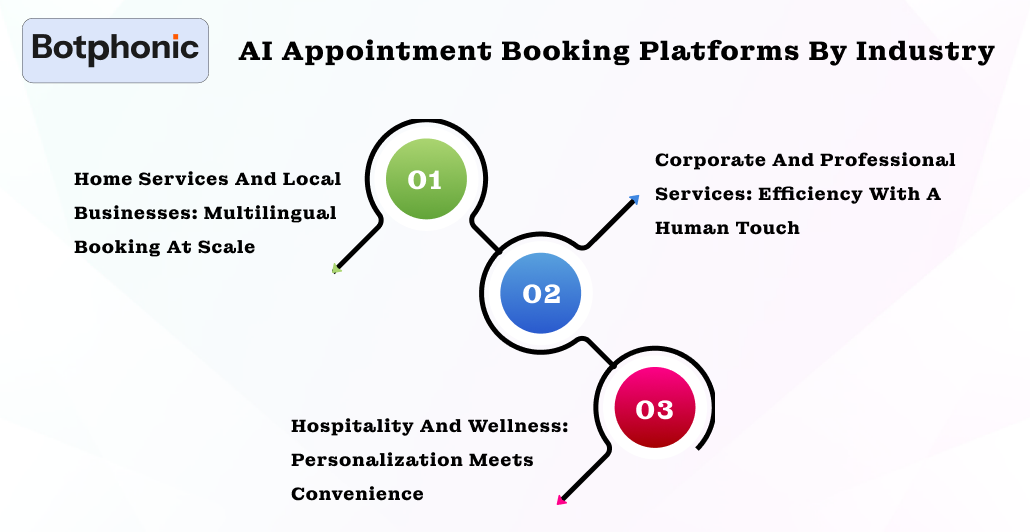
AI appointment booking does not suit every industry alike. The training of the data has presented different ways in which this technology can be applied across several industries. In addition, it is improving the way appointments are scheduled, managed, and optimally uses the data. Every sector of automation is helping in its own way. It is cutting down the administrative workload and at the same time improving customer experience. Let us look into it and dig deeper:
1. Home Services and Local Businesses: Multilingual Booking at Scale
AI has turned the formerly disjointed and confusing reservations into a seamless and customer-friendly experience for home service providers like plumbers, electricians, cleaners, etc. A multilingual AI appointment booking system guarantees that a diverse clientele can easily access the services.
AI makes the following contributions for home service providers:
- AI Virtual Receptionist: It is capable of handling multiple calls at the same time and makes sure that no customer has to wait.
- Geolocation Optimization: The AI system automatically assigns the technician who is nearest to the job and is available.
- Smart Upselling: During the booking process, it recommends related services based on the data of customers’ past interactions.
2. Corporate and Professional Services: Efficiency with a Human Touch
AI booking systems are used in law firms, consultancies, and real estate agencies. To the point of actually managing high-value client interactions. Offering a high level of personalization and professionalism.
The above-mentioned advantages consist of:
- Calendar Syncing: Coordinating with Google, Outlook, or CRM systems is a simple task with the help of automation.
- Smart Prioritization: AI cleverly routes VIP clients to the most senior staff members first.
- Integrated Voice AI: It allows smooth and consistent client experiences across the phone and other digital and non-digital channels owing to its branding.
3. Hospitality and Wellness: Personalization Meets Convenience
Repeat customers and personalized service are the main focus of spas, gyms, and hair salons. Voice AI and automated appointment booking AI are the technologies that provide personalization to the booking experience for maximum customer interaction.
The following are some of the main capabilities:
- Customer history is taken into account and recommendations are accordingly shared.
- The customer is automatically offered upselling during seasonal offers or packages.
- The customer is given the option to choose which loyalty program they want to earn points from to strengthen their retention.
Customers can now say, “Book my massage for Tuesday of next week,” and the AI call assistant will take care of the rest.
Features of the Modern AI Appointment Booking Systems
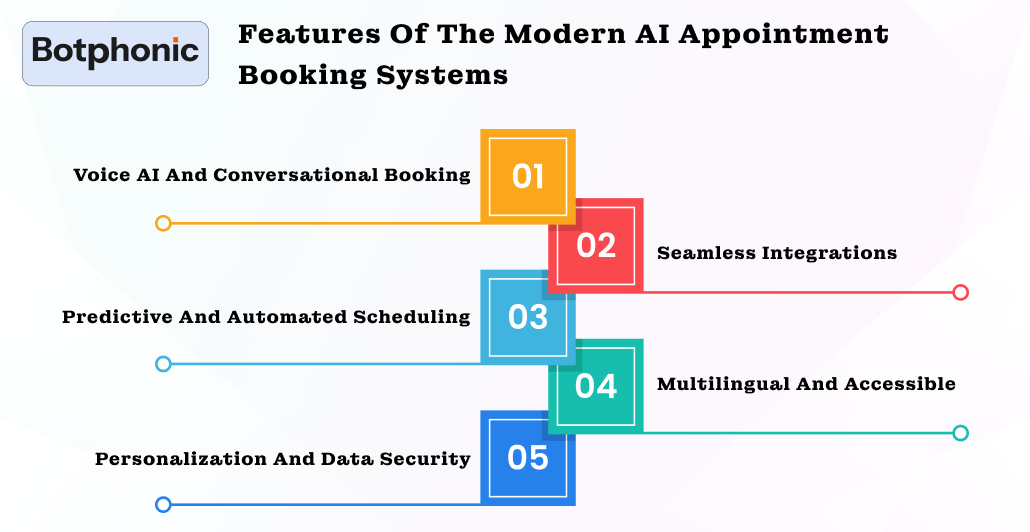
Modern AI appointment booking systems are not just about scheduling anymore. They are bringing together automation, personalization, and intelligence that completely change the way businesses handle time and customer engagement.
1. Voice AI and Conversational Booking
An AI voice agent appointment booking system depends on natural language processing to understand and interact with customers in real-time. These systems are designed to function nonstop. While catering to many languages, and at the same time provides a human-like experience for different sectors.
2. Seamless Integrations
AI tools can be easily connected with Google AI booking appointments, CRMs, and calendar platforms. This also helps in avoiding the risk of double-booking, ensuring accuracy, and keeping the customer data organized across channels.
3. Predictive and Automated Scheduling
The machine learning-based scheduling systems can predict appointment cancellations with high accuracy, recommend optimal times, and do the sending of automatic reminders. It results in reduced no-show rates and improved utilization of resources.
4. Multilingual and Accessible
An AI appointment scheduling system that can speak multiple languages has got rid of the problem of communication and is able to provide customer service in the absence of a client’s preferred language. It improves the overall efficiency of the workflow while preserving the tone and accuracy.
5. Personalization and Data Security
The artificial intelligence technology is capable of knowing all the users’ habits and preferences just through their first session, for example, it will list the preferred times, staff, or services. Besides, it will keep the data under encryption and monitoring with HIPAA and GDPR regulations.
To sum up, we can say that AI booking systems are nothing but a smart, safe, and user-friendly tool. Be it a voice AI appointment booking system in a car service center, or a virtual receptionist AI in healthcare, they are all providing unparalleled efficiency and comfort.
Now stop missing your appointments with simple deployment of an AI appointment booking in your workflow.
Contact Botphonic Today!!Future Trends in AI Appointment Booking
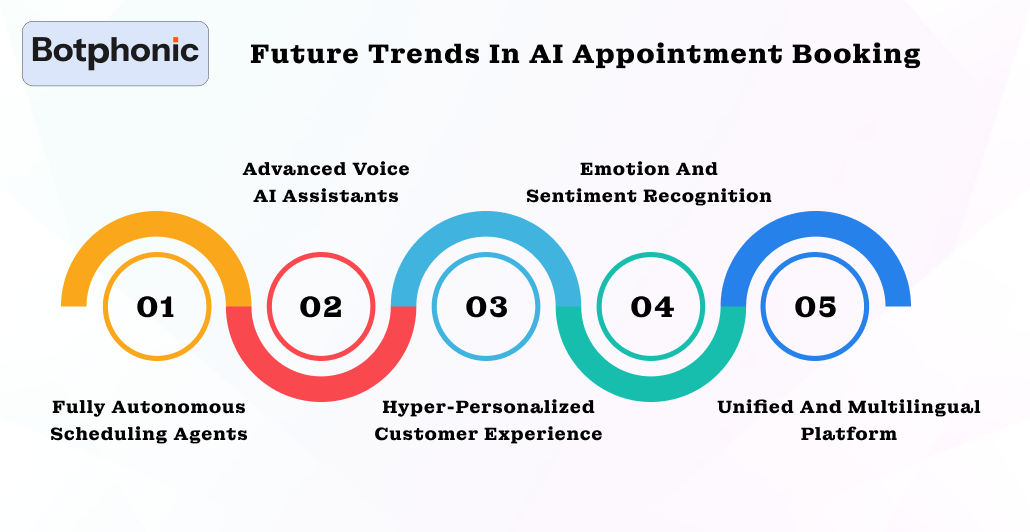
With the help of technology, the AI appointment booking system is becoming a partner by its capability of performing autonomously the most difficult offline tasks like sorting and categorizing. However, the next wave of innovation is already there, and it is focusing on personalization, intelligence, and seamless voice-driven interactions.
1. Fully Autonomous Scheduling Agents
Appointment booking AI can take over the whole process from identifying available slots to confirming with customers, completely unattended. These agents are now connecting with multiple platforms, calendars, and CRMs just like digital employees do.
2. Advanced Voice AI Assistants
By 2025, AI voice assistant appointment booking technology will have become the standard in healthcare and numerous other service industries. Expecting human-like tone, emotional recognition, and contextual memory for smoother interactions is not an impossible thing now.
3. Hyper-Personalized Customer Experience
Machine learning appointment booking systems effectively optimize behavioural data to predict preferences and suggest optimal times, while personalizing each reminder individually. Furthermore, adding these elements in the interaction makes the experience better and enhanced.
4. Emotion and Sentiment Recognition
Voice-based AI interprets tone and sentiment to respond to users’ queries empathetically. This component is ideal for industries like healthcare and wellness, where comfort and trust are main elements.
5. Unified and Multilingual Platform
Global businesses tend to rely on a multilingual AI appointment booking system. Seamlessly managing communication across different regions and time zones, it ensures accessibility for all customers.
The future of AI appointment booking is smarter, along with being multilingual and emotionally aware. By 2026, AI won’t be just helping you in booking platforms, but it will help you manage your relationships, driving productivity and customer loyalty.
Conclusion
The period of missed calls, double bookings, and frustrated customers is moving rapidly. Machine learning appointment booking systems have transformed the process from simple automation tools to an intelligent business partner. They are now capable of learning, adapting, and optimizing the resources with each interaction made. Whether it’s a voice AI appointment booking system that handles multilingual clients or a virtual receptionist AI ensuring 24/7 availability, AI is just revolutionizing the methods businesses use to manage time and relationships. Even in recent studies it estimated that by 2028, around 15% of daily work decisions will be autonomous.
Across home services, corporate sectors, and whatnot, AI is delivering one universal advantage, and that is efficiency with empathy. It’s no longer related to scheduling only, but it has become all about building a smoother, smarter, and human customer experience.
